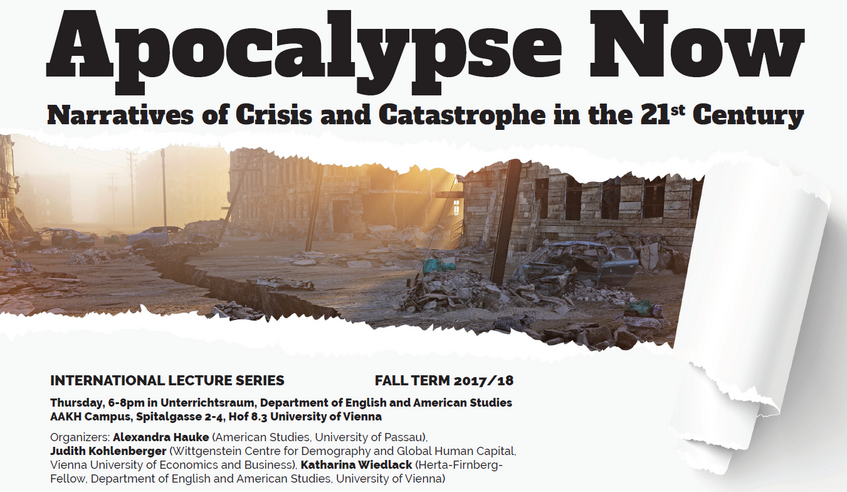Apocalypse Now: Narratives of Crisis and Catastrophe in the 21st Century
Apocalypse Now: Narratives of Crisis and Catastrophe in the 21st Century
International Lecture Series
Fall Term 2017/18
After 2016, a year universally hailed as ‘the worst one ever,’ many of us have come to view the world as a place of constant ruin where apocalyptic thinking and a rhetoric of imminent disaster dominate our everyday practices. This lecture series attempts to provide nuanced answers to questions arising from this ‘current age of crisis’ as exemplified by global migration flows caused by civil wars and famine, the European right wing gaining substantial ground, and political populism on the rise in the United States and beyond. In both dystopian and utopian visions of societies arising from devastation, destruction and liberation are inextricably entangled. In the history of Western civilization, such a biblical structure of punishment and redemption becomes particularly acute, suggesting that the ‘Old World’ makes room for a new, ostensibly better place. Narratives of crisis and catastrophe can thus serve as viable vehicles for envisioning a brighter future—a future beyond the economic, ecological, and social disasters of the present. While catastrophes, be they natural or man-made, threaten the wholesale extinction of humanity, they simultaneously announce the possibility of redemption and the dawning of a new beginning, purging civilization of evil, decadence, and moral decay. Special emphasis will be placed on the apocalyptic dimension(s) of literary, cultural, political, and social realities as well as their creative potential for change in the 21st century.
Like open wounds for societies that have become too self-centered and complacent, catastrophes and crises can be seen as both inevitable and ultimately beneficial for humanity, offering the welcomed possibility of a new and fresh start. The contributions in this international lecture series range from the humanities, social sciences, and anthropology to economics, statistics, and data science, and will explore how crises in Western society, literature, film, and popular culture may propel affirmative visions of global change. The interdisciplinary and intersectional approaches at play are set to discern the discourses, aesthetics, and representations of/in 21st-century narratives of crisis, catastrophe, and apocalypse in order to demonstrate how tales of de- and reconstruction negotiate the contemporary human condition in an era of global social, cultural, and political upheaval.
Organizers:
Alexandra Hauke (American Studies, University of Passau)
Judith Kohlenberger (Wittgenstein Centre for Demography and Global Human Capital, Vienna University of Economics and Business)
Katharina Wiedlack (Herta Firnberg Fellow at the Department of English and American Studies, University of Vienna)

